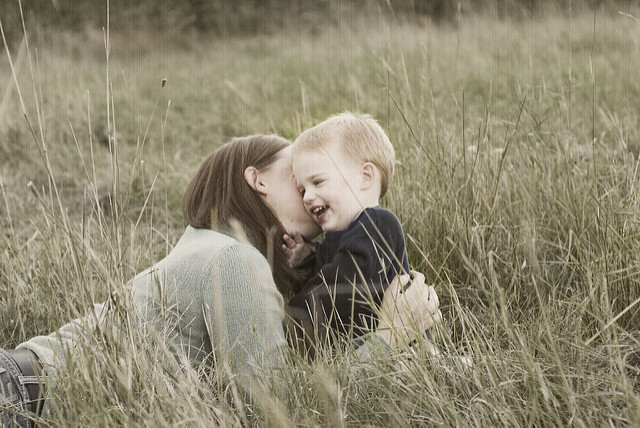Mindfulness is the last thing on our minds as mothers of toddlers.
A two to four year-old heaps enough on our plate with wanting to play. Every. Single. Moment. With. Us.
The moments between being pulled away from whatever it is we’re always trying to do as Goddess of our Household (to help build or to help make something) are littered with: “Mommy! Mom! Mommy!,” creating an unending cycle of distracted mothering.
It’s easy to lose grasp on priorities, our mental order, and on ourselves when we are constantly bombarded by the demands of a young person, together with the demands of daily life. It’s a “good problem to have,” as they say.
But in this age of women doing often everything (no, literally—everything—thanks to the balance of home management and expectations of the workplace), we find our day lost in the abyss when we have one thousand things we’re trying to commit to at the same time. Some of them, we really wanted to enjoy—namely, spending time with our children.
Multi-tasking is being found to actually harm productivity and the ability to focus. In a study by Ophir, Nass, and Wagner (2009), “chronically high multi-taskers were more readily distracted by [both] irrelevant external stimuli…”, and “performance on individual tasks may suffer such that errors are made and overall productivity is diminished”.
~
Bladder leaks & lackluster Sex are so 2024. Bid farewell to a weak pelvic floor with this award-winning, ingenious device + a free bag of craft Arabica coffee >
~
So, it is with this in mind (along with those other 999 things, natch) that I present:
The Ways to Practice of Mindfulness with our Little Noisy Whirlwinds of Mindlessness:
1. Have “mommy’s things” on in the background
I’m talking about Oprah Network’s Super Soul Sunday, or music, or that weird addiction we all used to have to foodie shows on The Food Network. Yes, this is a bit counter-intuitive to the whole premise of this article. But it serves two purposes. One—it helps us to stay in touch with our interests (serving our sense of self-awareness) while we might be otherwise in full debate about the merits of Elmo vs. Bob the Builder, and two—magic happens when our children are no longer interested in whatever media is on. They play! Thus releasing us of the guilt associated with the time our children spend being entertained by the TV.
2. When it’s time to play, play!
Try to do a little quick-time budgeting for whatever else there is to accomplish that day. If time can be spared (and it always can be, since there will always be more things that have to get done), jump in and fully participate with children in what they want to do. It will feel like more has been done with the day by building sandcastles for an hour and being focused on our child and his laughter (which is a finite resource), than if we spend our whole day doing endless baskets of laundry. Which, let’s face it—we’ll be doing the rest of our lives once our children have flown the nest.
3. Think about the bigger picture
It is easy to get caught up in the frustration of always feeling “behind the eight-ball” and feeling ever more inadequate. To make matters worse—the little one might keep pulling us away from actually getting things done so that we could actually have some free time (which is almost a mathematical impossibility for a working mother, see #2.)
But a child will live a life that has a much farther reach than we could possibly imagine. Not just in possible multiplying of family and future generations, but with the adventures she will have and the impact she will have on the world and on others’ life experiences, as she travels her path.
I like to think that enjoying my child, and gazing into his eyes, and looking at his hands—is something akin to staring up into the night sky to get a sense of how small we are, and how unimportant it is to get that lunch packed right this minute, in the grand scheme of things.
What is important, is the sort of childhood experience our little dominoes remember having, and the people that are shaped by the time they spent (or didn’t spend) with Mom. Being present for them is what will have the greatest positive impact, sending ripples of unfathomable distance.
4. Find things to make play enjoyable so we stop thinking about what we’re not doing
Oh, the tedium of Legos and playing “kitchen,” and the soul-draining noise of much of children’s television programming. Once I was able to stop banging my head against the wall long enough to notice there were things I could actually enjoy about children’s entertainment (no, for real—like on a genuine, looking-forward-to-it level, not on an I-like-that-they-like-it level), it was a whole different ball game.
When we play Legos, I like imagining what my dream palace would look like, provided the materials at-hand. Mine would be all emerald-green, with turrets and little settees. Then I go about the challenge of creating as close to an approximation of my vision as I can. When we play kitchen, I have my son whip me up a bottomless pot of “coffee” and I request different pastries so I can pretend I’m back at one of the cafes I would frequent when I actually had disposable income.
It’s almost as relaxing, especially when I can zone out while he goes about the business of “making it.” I’ve found appreciating the nuances of the artwork on a few of my son’s favorite shows, Peg + Cat inspires pulling out a tablet of graph paper to spin out a few colorful doodles. I absolutely watch Lalaloopsy for the fashion. Peppa Pig is gratifying because of its simple, modern aesthetic. I love settling into the comforting British accent of Peppa and her family; it’s like putting on a heavy, speckled wool sweater with leather patches on the elbows.
~
So, the next time the day is turning into a blur of time spent running circles around the little ones running circles around us, frustration building from what should be getting done and what isn’t getting done because we’re having to answer so many questions, or having to help set up or put away or clean this or fix that, and we are thoughtlessly shoving aside the enjoyable day we could be having—thinking that if it all gets done, there will finally be time to be present with our children…let’s stop.
Focus.
If we’re mindful of the quality of our time, we’ll feel as though we have made the best use of our day.
Author: Carisa Peterson
Editor: Sara Kärpänen
Photo: Photosavvy / Flickr











Read 0 comments and reply